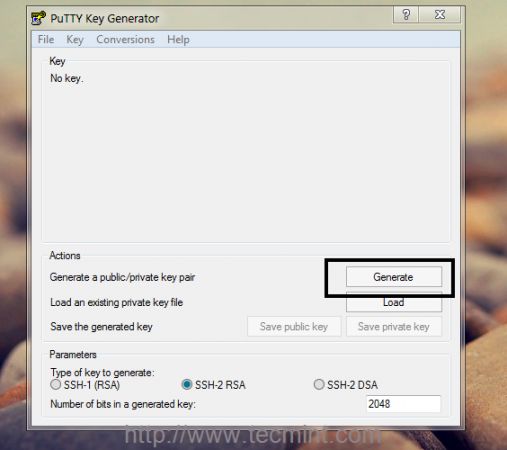Rsa 2048 Generate Public Private Key
Run it on your local computer to generate a 2048-bit RSA key pair, which is fine for most uses. Ssh-keygen The utility prompts you to select a location for the keys. By default, the keys are stored in the /.ssh directory with the filenames idrsa for the private key and idrsa.pub for the public key. Reasons for importing keys include wanting to make a backup of a private key (generated keys are non-exportable, for security reasons), or if the private key is provided by an external source. This document will guide you through using the OpenSSL command line tool to generate a key pair which you can then import into a YubiKey. You can generate a public and private RSA key pair like this: openssl genrsa -des3 -out private.pem 2048 That generates a 2048-bit RSA key pair, encrypts them with a password you provide and writes them to a file. You need to next extract the public key file. For these steps, you will need a command line shell with OpenSSL. Ideally, you should have a private key of your own and a public key from someone else. For demonstration, we will only use a single key pair. Generate Private Key. Run this command to generate a 4096-bit private key and output it to the private.pem file. If you like, you may. Oct 05, 2007 To generate a pair of public and private keys execute the following command: ssh-keygen -t rsa -b 2048 You can use “dsa” instead of the “rsa” after the -t to generate a DSA key. The number after the -b specifies the key length in bits. That changes the meaning of the command from that of exporting the public key to exporting the private key outside of its encrypted wrapper. Inspecting the output file, in this case privateunencrypted.pem clearly shows that the key is a RSA private key as it starts with -BEGIN RSA PRIVATE KEY-. Visually Inspect Your Key Files. Online RSA Key Generator. Key Size 1024 bit. 1024 bit; 2048 bit; 4096 bit Generate New Keys Async. RSA Encryption Test. Text to encrypt.
Download and install the OpenSSL runtimes. If you are running Windows, grab the Cygwin package.
OpenSSL can generate several kinds of public/private keypairs.RSA is the most common kind of keypair generation.[1]
Other popular ways of generating RSA public key / private key pairs include PuTTYgen and ssh-keygen.[2][3]
Generate an RSA keypair with a 2048 bit private key[edit]
Execute command: 'openssl genpkey -algorithm RSA -out private_key.pem -pkeyopt rsa_keygen_bits:2048'[4] (previously “openssl genrsa -out private_key.pem 2048”)
e.g.
Make sure to prevent other users from reading your key by executing chmod go-r private_key.pem afterward.
Extracting the public key from an RSA keypair[edit]
Execute command: 'openssl rsa -pubout -in private_key.pem -out public_key.pem'
e.g.
Rsa 2048 Encryption
A new file is created, public_key.pem, with the public key.
It is relatively easy to do some cryptographic calculations to calculate the public key from the prime1 and prime2 values in the public key file.However, OpenSSL has already pre-calculated the public key and stored it in the private key file.So this command doesn't actually do any cryptographic calculation -- it merely copies the public key bytes out of the file and writes the Base64 PEM encoded version of those bytes into the output public key file.[5]
Viewing the key elements[edit]
Execute command: 'openssl rsa -text -in private_key.pem' Dota 2 beta steam key generator no survey.
All parts of private_key.pem are printed to the screen. This includes the modulus (also referred to as public key and n), public exponent (also referred to as e and exponent; default value is 0x010001), private exponent, and primes used to create keys (prime1, also called p, and prime2, also called q), a few other variables used to perform RSA operations faster, and the Base64 PEM encoded version of all that data.[6](The Base64 PEM encoded version of all that data is identical to the private_key.pem file).
Password-less login[edit]
Often a person will set up an automated backup process that periodically backs up all the content on one 'working' computer onto some other 'backup' computer.
Rsa 2048 Generate Public Private Key Authentication
Because that person wants this process to run every night, even if no human is anywhere near either one of these computers, using a 'password-protected' private key won't work -- that person wants the backup to proceed right away, not wait until some human walks by and types in the password to unlock the private key.Many of these people generate 'a private key with no password'.[7]Some of these people, instead, generate a private key with a password,and then somehow type in that password to 'unlock' the private key every time the server reboots so that automated toolscan make use of the password-protected keys.[8][3]

Further reading[edit]
- ↑Key Generation
- ↑Michael Stahnke.'Pro OpenSSH'.p. 247.
- ↑ ab'SourceForge.net Documentation: SSH Key Overview'
- ↑'genpkey(1) - Linux man page'
- ↑'Public – Private key encryption using OpenSSL'
- ↑'OpenSSL 1024 bit RSA Private Key Breakdown'
- ↑'DreamHost: Personal Backup'.
- ↑Troy Johnson.'Using Rsync and SSH: Keys, Validating, and Automation'.
- Internet_Technologies/SSH describes how to use 'ssh-keygen' and 'ssh-copy-id' on your local machine so you can quickly and securely ssh from your local machine to a remote host.